- Best for communicating with patients: Zoho CRM
- Best for growing profitability through marketing, sales and service: Insightly
- Best for managing invoices and billing: Onpipeline
- Best for managing patient support tickets: Zendesk
- Best for collaboration between departments: monday CRM
- Best for patient segmentation: Pipedrive
A healthcare CRM is customer relationship management software specifically designed for use in the healthcare or pharma industry. Doctor’s offices, clinics and hospitals use these specialized CRM software to streamline patient information, appointments and communication.
Some popular healthcare CRM providers we’ve highlighted include Pipedrive, Zoho CRM, Zendesk and many more. The goal of implementing these healthcare CRM providers is to ensure healthcare delivery is more efficient and personalized.
Top healthcare CRM software comparison
Since healthcare CRM tools are meant to log and track patient relationships, basic CRM features that typically focus on clients are just shifted to prioritize patients instead. So this includes housing contact information, patient forms and documentation, medical history notes and more. The goal is to retain patient information in secure and legally compliant forms, increase patient satisfaction and track the business success of the practice.
| Data security | Document management | Activity tracking | Integrations (native or third-party) | Pricing | |
|---|---|---|---|---|---|
| Zoho CRM | HIPAA and GDPR compliant, AICPA and SOC | Yes | Yes | 800+ | Free starting price |
| Insightly | HIPAA, SOC2 and GDPR compliant | Limited | Limited | 1,000+ | $29 per user per month* |
| Onpipeline | HIPAA, 2FA, AWS hosted, TLS 1.2 | Yes | Yes | 50+ | $25 per user per month** |
| Zendesk | HIPAA, GDPR, CPA, SOC 2, FSQS | Limited | Yes | 1,000+ | $19 per agent per month* |
| monday CRM | SOC 1 Type II, SOC 2 Type II, SOC 3, GDPR, CCPA, HIPAA | Yes | Yes | 100+ | $12 per user per month* |
| Pipedrive | GDPR compliant, SOC 2 and 3, security alerts, user access and device logs | Yes | Limited | 350+ | $14.90 per user per month* |
*Starting price when billed annually.
**Starting price when billed monthly.
Zoho CRM: Best for communicating with patients
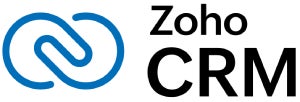
Through Zoho CRM’s integrations and omnichannel functions, admins can manage different aspects of hospital operations efficiently with quick access to critical patient information. User-friendly forms; consultation requests; and mail, telephony, live chat, SMS, and social media integrations all allow for quick communication and collaboration with patients.
Pricing
- Free CRM: Free for up to 3 users and comes with lead and document management and a mobile app.
- Standard: $14 per user per month, billed annually, or $20 per user when billed monthly. Users can access email insights, sales forecasting and multi-currency support.
- Professional: $23 per user per month, billed annually, or $35 per user when billed monthly. This tier includes all Standard features plus assignment rules and unlimited custom reports and dashboards.
- Enterprise: $40 per user per month, billed annually, or $50 per user when billed monthly. This plan introduces all AI-powered tools plus email segmentation, auto-response and more.
- Ultimate: $52 per user per month, billed annually, or $65 per user when billed monthly. Ultimate grants access to all mentioned features plus access to Zoho Analytics.
Features
- Mobile app: Track medical sellers or even traveling clinics through territory management and access patient information all on the go.
- Inventory management: Monitor product movement and efficiently track all payments through an inventory dashboard.
- Document management: Sign medical and administrative paperwork digitally with Aadhaar-based e-signatures, compliant under section 3A of the IT Act, to generate digital records.
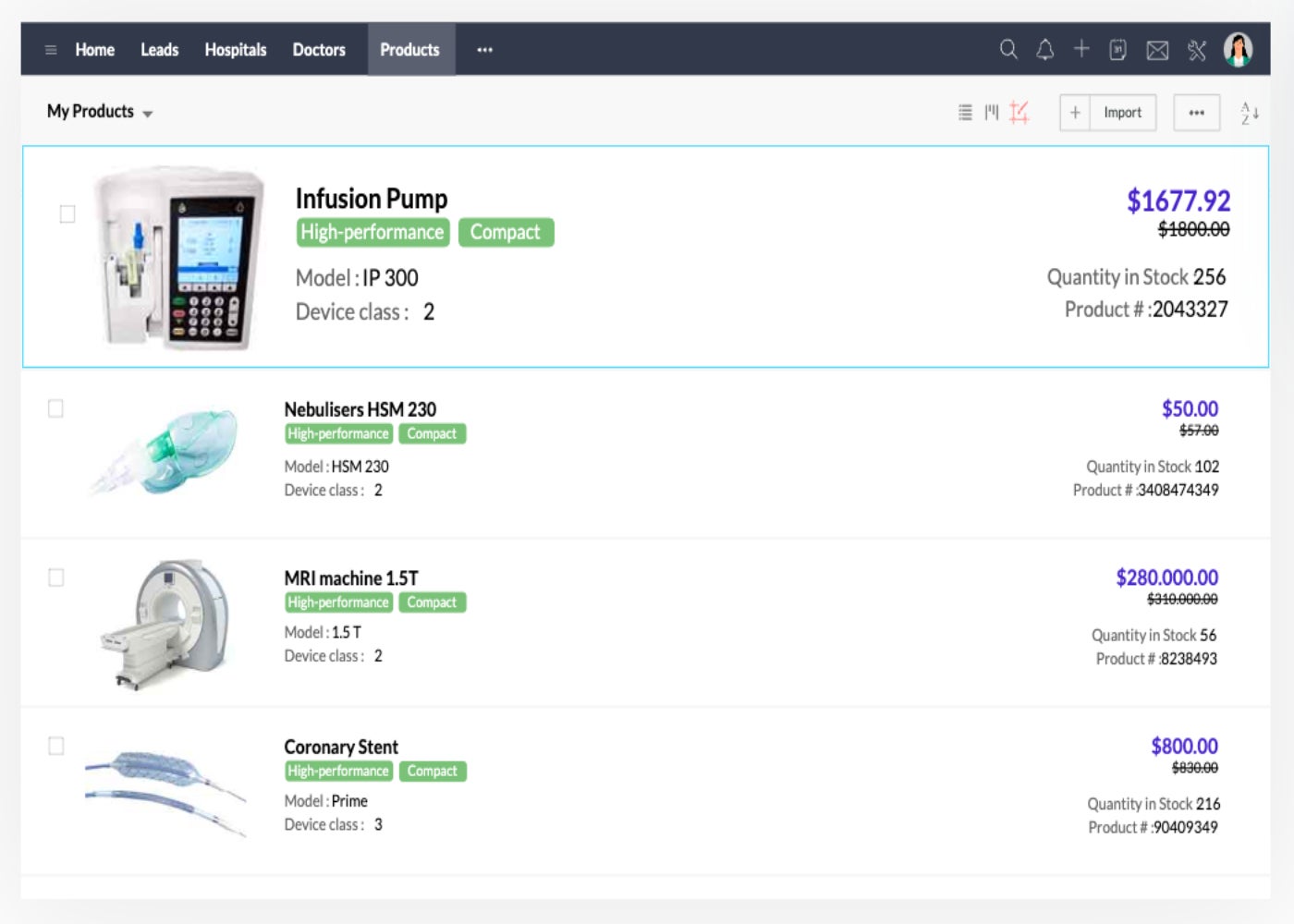
Zoho CRM pros and cons
| Pros | Cons |
|---|---|
| 15-day free trial. | Users report occasional delays in data refreshing. |
| Offers advanced collaboration tools for marketing and sales teams. | Users report poor online customer support. |
| 800+ possible apps to integrate. | The free tier doesn’t support social integration. |
Why we choose Zoho CRM
Zoho CRM can be used as a sales CRM for both sellers in the healthcare industry and actual providers of healthcare services. This makes it a great option for either business type, while always keeping the patients’ or clients’ needs at the forefront. The software offers custom solutions, data security and multi-platform compatibility for users to facilitate high-quality experiences for their customers.Zoho CRM can be scaled to meet the needs of just about any size of organization, from startups to enterprises. Its customer support and reportedly slow onboarding process might be a cause for concern for organizations that want to get a CRM tool up and running quickly, making alternatives like Insightly or Zendesk more appealing.
Check out our Zoho CRM review for more details on this provider.
Insightly: Best for growing profitability through marketing, sales and service
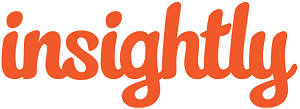
Insightly offers end-to-end solutions for businesses, from marketing and sales to ongoing patient support. With this heightened focus on patient experience from beginning to end, Insightly’s CRM allows for strong sales pipelines made of automations, lead assigning, templates and kanban views. Organizations strengthen their customer service in healthcare by improving the overall flow of operations. With Insightly’s ease of use and compliance, businesses can grow their revenue all while building lasting patient relationships.
Pricing
- Plus: $29 per user per month, billed annually. The Plus plan includes lead management, automated emails and templates, task management, configurable reports and more.
- Professional: $49 per user per month, billed annually. The Professional plan offers all Plus features as well as 100 real-time insight cards, unlimited role-based permissions, custom page layouts and more.
- Enterprise: $99 per user per month, billed annually. This plan includes all mentioned features, in addition to 200 custom fields, custom apps, calculated fields, pricebooks, quotes and more.
Features
- Products, pricebooks and quotes: Create billing velocity by configuring quotes directly from patient records, and generate PDFs or email quotes within the platform.
- Patient management: Capture the correct information about every client, patient or account, and make it accessible to key stakeholders in every department.
- Performance dashboards: Customize business-specific KPIs to view key metrics that are visible at a glance and in real time.
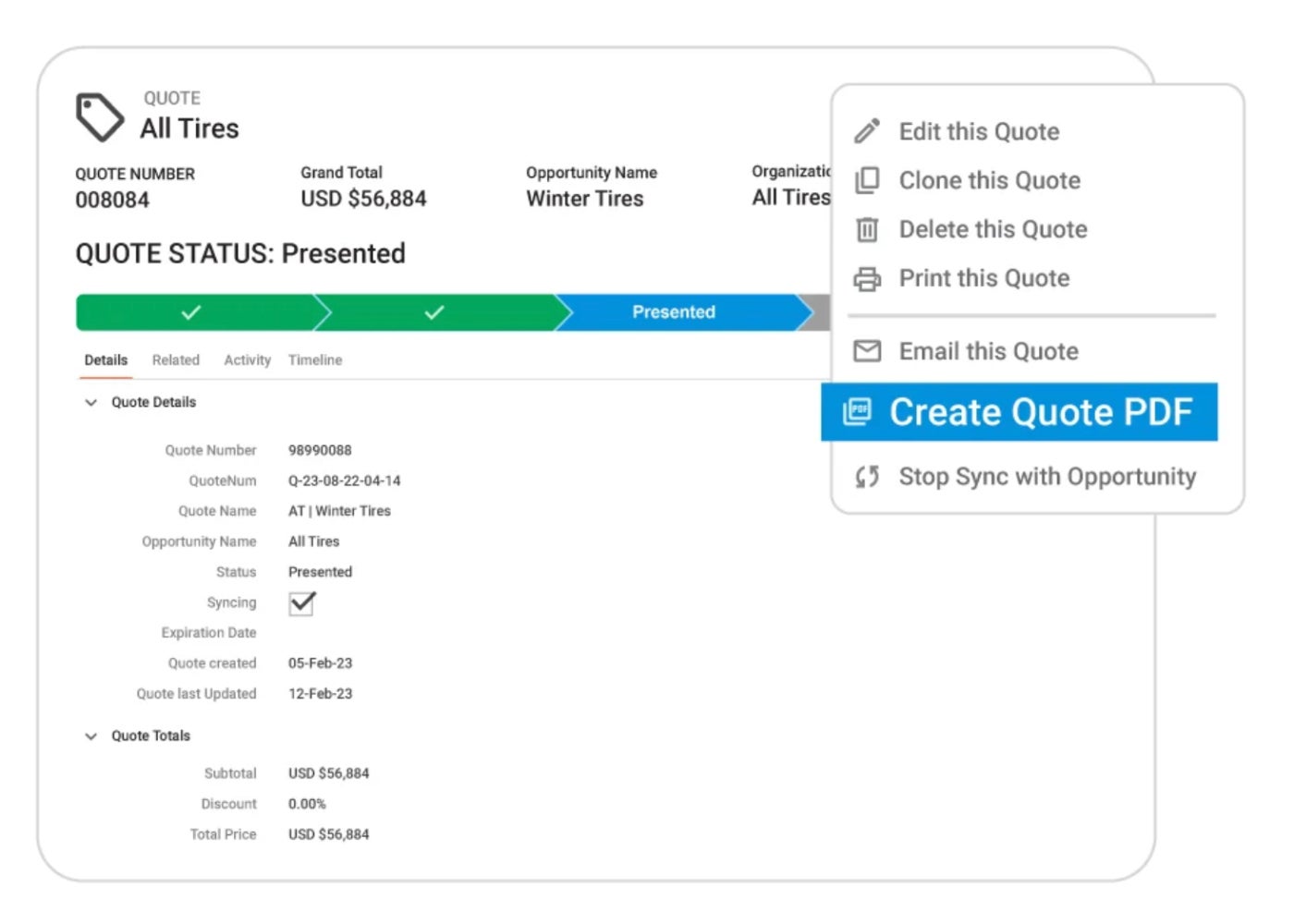
Insightly pros and cons
| Pros | Cons |
|---|---|
| 14-day free trial. | Advanced user permissions are only available in the premium plans. |
| 1,000+ possible integrations. | Users report difficult integration setup. |
| Offers advanced project management tools. | Limitations around building custom reports. |
Why we choose Insightly
Insightly is a modern cloud-based CRM tool built with healthcare data security in mind. It’s secure and data compliant. Insightly is often praised by users for its easy implementation, minimal user training requirements and robust CRM features. Hospitals, clinics and private providers alike will gain access to pipeline management tools, patient relationship features and secure and centralized data to pull helpful reports from.
Insightly offers key marketing features such as web-to-lead captures. If you’re wanting a similar tool with even more marketing capabilities and competitive pricing, check out Zoho CRM for their omnichannel marketing and social integrations.
To learn more, head over to our independent Insightly review.
Onpipeline: Best for managing invoices and billing

Onpipeline can streamline creating quotes, invoices and billing within the software. With the help of templates, history and automatic currency conversions, organizations can collect digital signatures from patients. With fully integrated invoicing software, users can create multilingual and multi-currency invoices and send them in a click. Additionally, reminders or notices and record payments can be sent to patients directly from the platform.
Pricing
- Pipeline: $25 per user per month when billed monthly. This tier supports contact management, multiple sales pipelines, unlimited deals and more.
- Standard: $39 per user per month when billed monthly. This plan offers lead management, email and SMS automations, web forms, quotes and more.
- Advanced: $58 per user per month when billed monthly. This tier includes a VIP data center, sales goals, bulk emails, automatic invoices, audit logs and more.
Features
- 360-degree patient profile: View all patient records through a centralized view
- Appointment booking: Share doctor or clinic availability for patients to book services through a web page 24/7.
- Invoice management: Create multilingual or multi-currency invoices and share them with other providers or patients with a click. There’s the additional feature of sending reminders or notices.
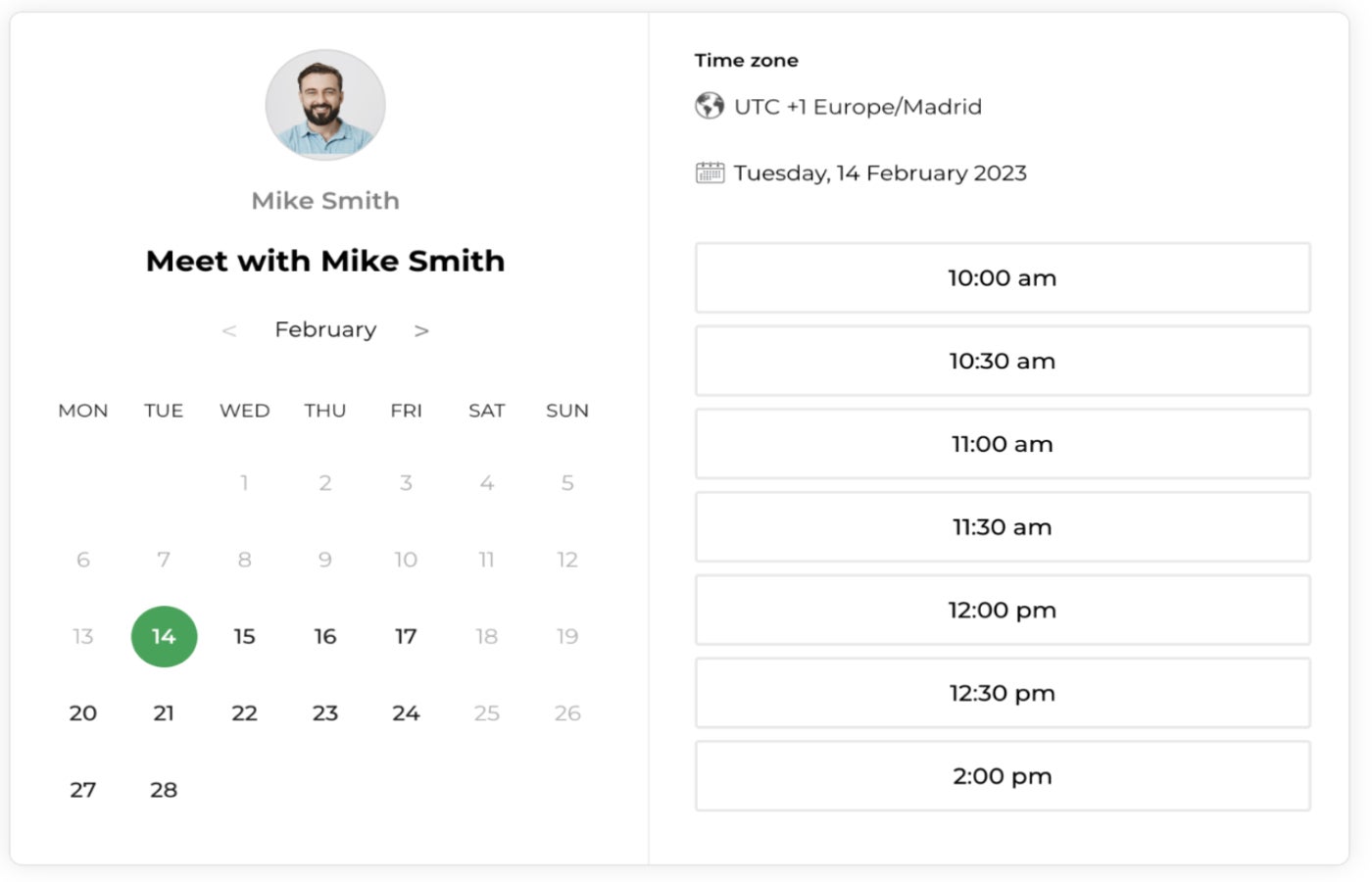
Onpipeline pros and cons
| Pros | Cons |
|---|---|
| 30-day free trial. | Limits data imports to only CSV files. |
| Offers API and widgets to build applications to integrate within the tool. | Users report lacking reporting and analytic features. |
| No free version is offered. | Only bills users monthly, with no option for an annual subscription and discount. |
Why we choose Onpipeline
Onpipeline offers a variety of solutions designed to meet diverse business CRM needs. The platform includes all essential CRM features while also being scalable. Businesses can manage contacts, patients or leads and the entire sales process, from pre- to post-sale tasks. From there, admins can organize daily activities, generate quotes, request and collect e-signatures and more.
While Onpipeline offers a competitive free trial length, its onboarding and implementation might take some time since it can only accept imported data from CSV files. If you’re in need of a solution you can get up and running almost immediately, look into Zoho CRM or monday CRM.
Zendesk: Best for managing patient support tickets

Zendesk delivers secure and personalized customer service that engages users and creates great experiences across the healthcare system for payers, providers and vendors. Within the Zendesk Support Suite, users can contact customer service through phone, chat, email, text and mobile. Since patients can be in need of care or consultations at any time, Zendesk’s proactive support and reminders allow businesses to be one step ahead of their needs.
Pricing
- Sell Team: $19 per agent per month, billed annually, or $25 per agent per month when billed monthly. This plan comes with two customizable sales pipelines, email and calendar integrations, robust APIs and more.
- Sell Growth: $55 per agent per month, billed annually, or $69 per agent per month when billed monthly. This tier supports all Sell Team features plus product and price books, sales forecasting and more.
- Sell Professional: $115 per agent per month, billed annually, or $149 per agent per month when billed monthly. This tier comes with all Sell Professional offerings, in addition to task automation, advanced roles and permissions and more.
- Sell Enterprise: Starts at $169 per user per month, but contact the sales team for a more accurate and customized quote.
- Suite Team: $55 per agent per month, billed annually, or $69 per agent per month when billed monthly. This plan supports a ticketing system, AI agents, prebuilt analytic dashboards, 1,000+ integrations and more.
- Suite Growth: $89 per agent per month, billed annually, or $115 per agent per month when billed monthly. This plan includes all Suite Team features plus multiple ticket forms, a self-service customer portal and more.
- Suite Professional: $115 per agent per month, billed annually, or $149 per agent per month when billed monthly. This tier offers all mentioned services, plus skills-based routing, custom and live analytics and more. Note that HIPAA compliance is only enabled in this tier and beyond.
- Suite Enterprise: Contact the sales team for a custom quote. This premium plan is available for advanced data privacy and protection add-on, content blocks, custom agent roles and more.
Features
- Message sequences: Communicate with patients with personal and timely email sequences and automated tasks.
- Bulk outreach: Send important updates, such as office holiday hours, to patients via bulk emailing.
- Activity reports: Track what activities have been completed for each account, patient or client. View call, email, and visit and billing history.
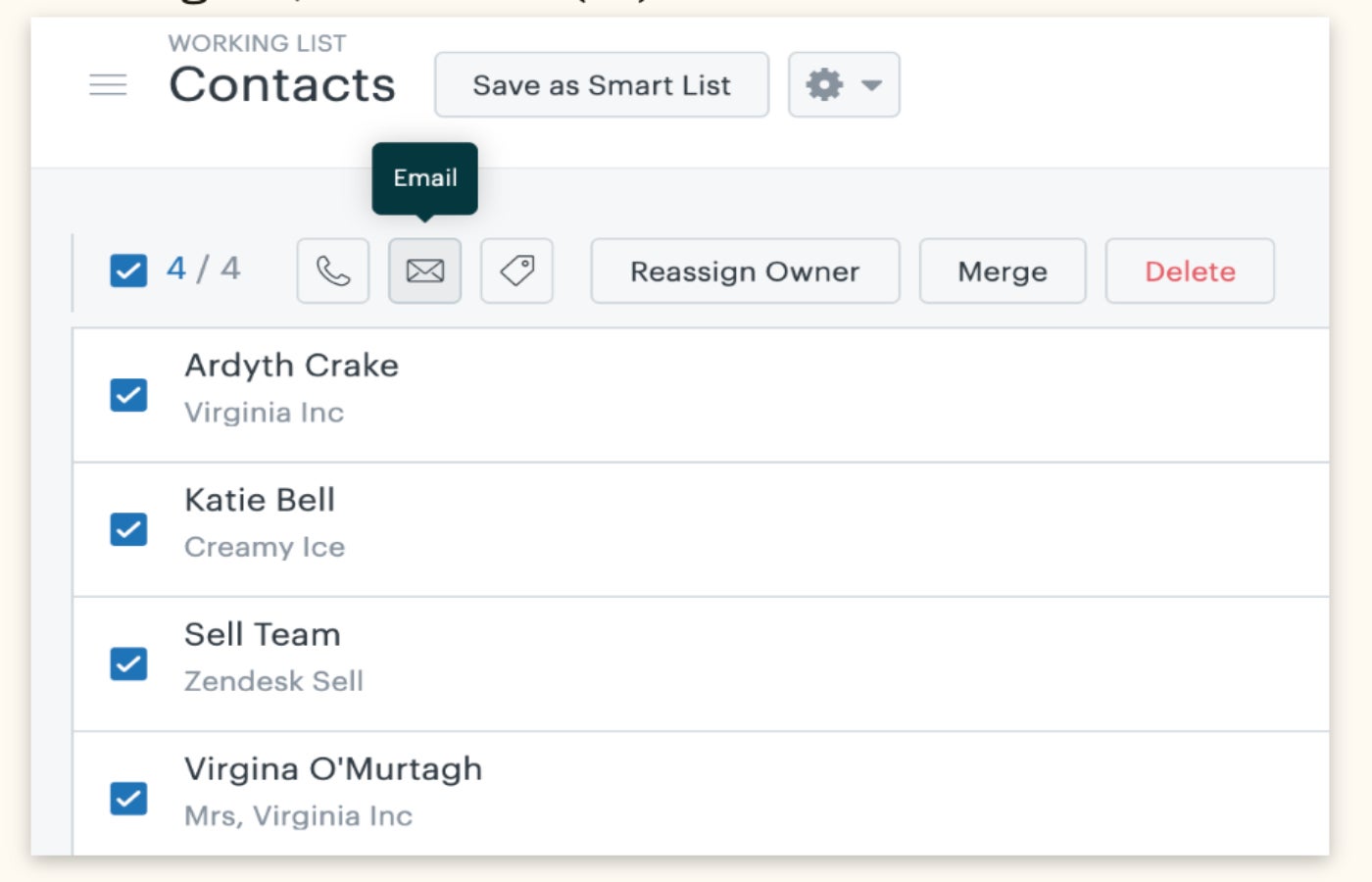
Zendesk pros and cons
| Pros | Cons |
|---|---|
| 14-day free trial. | Users report poor and inconsistent customer support. |
| User-friendly task management tools. | Onboarding might require training for some users. |
| Offers guided demos of their solutions. | Pricing plans are generally more expensive than those of some other providers on this list. |
Why we choose Zendesk
Zendesk is a modern CRM solution with service features such as messaging and live chat, help centers, workforce engagement and agent workspaces. Its service-first structure and strong data security and compliance make it a good choice for clinics highly interested in ongoing patient retention and security.
While Zendesk offers a new AI-powered CRM platform, their specialty is customer experience (CX) software with advanced support and ticketing features. If you’re wanting a solution with more robust sales features, look into Zoho CRM, Pipedrive or monday CRM.
monday CRM: Best for collaboration between departments

Within monday CRM, users can store all patient records, including medical histories, contact details, visit dates and medical bills, in one centralized location. Within patient profiles, administrators or doctors can attach files, photos or notes. This way, all data is immediately synced with all hospital departments in real time. Users can add comments to tasks, provide colleagues feedback and even share files with patients if needed.
Pricing
- Basic CRM: $12 per user per month, billed annually, or $15 when billed monthly. Users gain access to unlimited customizable pipelines and contacts, templates for lead and deal management, the mobile app and unlimited free viewers.
- Standard CRM: $17 per user per month, billed annually, or $20 when billed monthly. This plan includes all features in the Basic CRM tier plus email integrations, activity management, AI email generation, quotes and invoices and more.
- Pro CRM: $28 per user per month, billed annually, or $33 when billed monthly. The Pro CRM tier includes sales forecasting, email templates, email tracking, mass emails, Google Calendar sync and more.
- Enterprise CRM: Contact monday.com directly for a custom quote. This plan supports lead scoring, team goals, advanced analytics, account management and more.
Features
- Merge duplicate data: Receive notifications when a duplicate account or patient is submitted to the platform to eliminate any future overlaps and merge the data for the most up-to-date information.
- Activity management: Record all patient or contact-related tasks such as calls, meetings, notes and more to know when and how each patient was last communicated with.
- Monday AI: Generate appointment action items or use the AI assistant to create content for bulk emails or marketing materials.
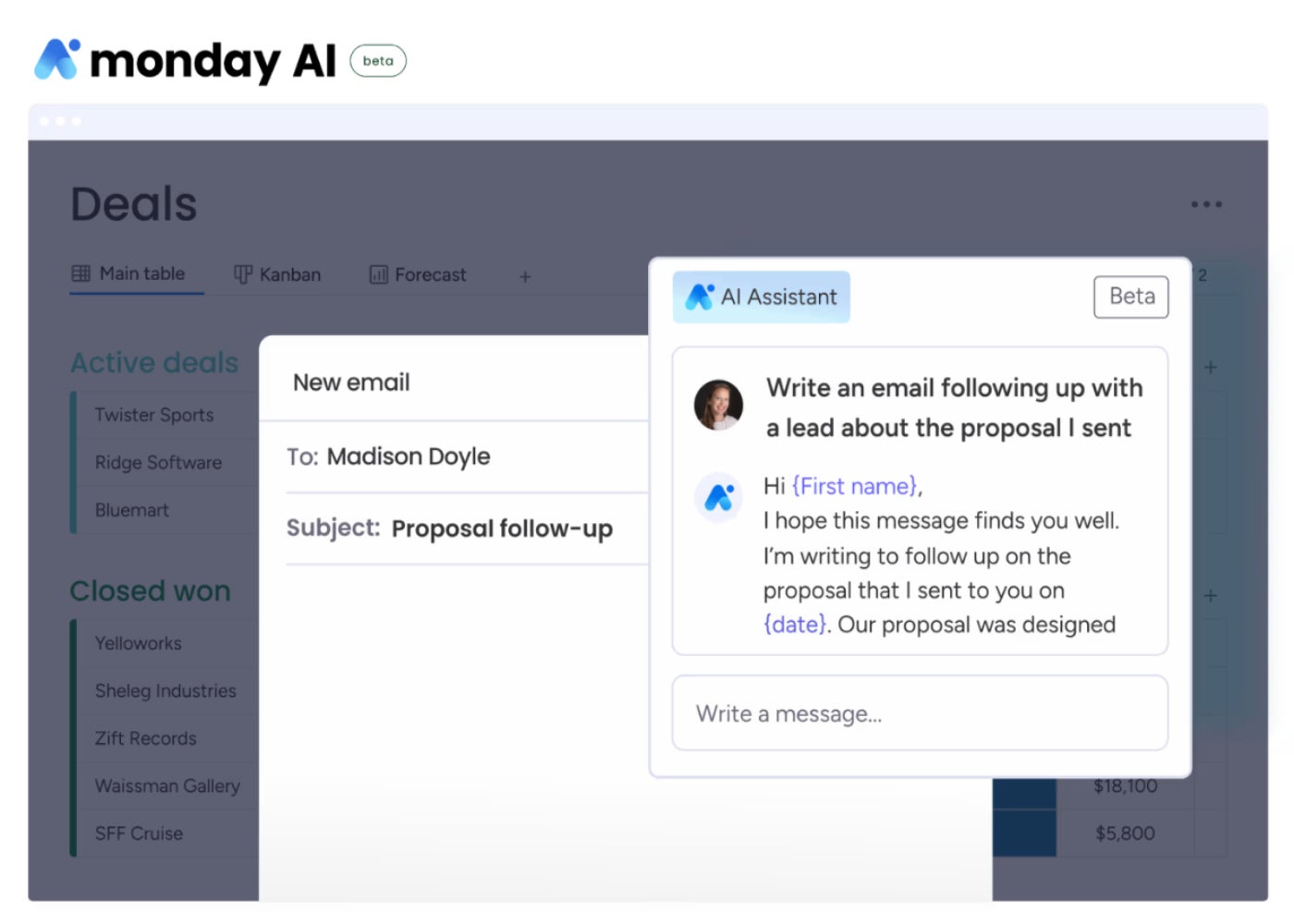
monday CRM pros and cons
| Pros | Cons |
|---|---|
| 14-day free trial. | HIPAA compliance is only available for the highest paid tier. |
| Students and nonprofits can qualify for free access to monday.com. | Insight and forecasting tools are only available through the Pro and Enterprise plans. |
| 100+ apps for potential integrations. | Users report occasional delays when waiting for support. |
Why we choose monday CRM
monday CRM is a fully customizable, cloud-based platform that healthcare professionals can implement to enhance their patient experience. The platform makes it easy to locate a patient’s medical, payment and behavioral history. From there, users can personalize messaging, boost follow-up care and improve overall patient satisfaction. All of this can be done within the visual and easily navigated interface of kanban and drag-and-drop dashboards.
While monday CRM can be HIPAA compliant, it’s only available in the Enterprise CRM premium plan. If you’re a smaller clinic or healthcare provider wanting a CRM solution that is HIPAA compliant without having to pay for the most expensive tier, consider looking into Zoho CRM or Onpipeline.
For more information, read the full monday CRM review.
Pipedrive: Best for patient segmentation

Pipedrive can automatically assign and segment new or current patients to a specific person, team or department within the practice. Users will create defined rules through the lead management automation that are based on need. For example, patients can be assigned based on location, medical issue, billing requests and more. Getting the patient to the right provider or department will ensure a short response time, personalized follow-up and a better patient experience.
Pricing
- Essential: $14.90 per user per month, billed annually, or $21.90 per user when billed monthly. The Essential plan includes people and organization management, products catalog, sales assistant and more.
- Advanced: $27.90 per user per month, billed annually, or $37.90 per user when billed monthly. The Advanced plan offers all Essential features plus automations, two-way email sync, group emailing and more.
- Professional: $49.90 per user per month, billed annually, or $59.90 per user when billed monthly. This tier supports all Advanced features and contacts timeline, free Smart Docs add-on, automatic assignment and more.
- Power: $64.90 per user per month, billed annually, or $74.90 per user when billed monthly. The Power plan includes all Professional offering plus phone support, 500 custom fields and more.
- Enterprise: $99.00 per user per month, billed annually, or $119.00 per user when billed monthly. This tier offers all mentioned features plus up to 180 active automations, unlimited teams and unlimited custom permissions.
Features
- Automated workflows: Create workflows that will automatically trigger sales actions such as confirmation emails after a patient schedules a visit.
- Pipeline management: Understand exactly where each patient is in your process, from new patient intake, visit scheduling, follow-up visits to billing and more.
- Customizable reports: Track default criteria like deal tracking, revenue forecasting, lead reporting and more while also customizing filters or groups to get a clear visual overview of business.
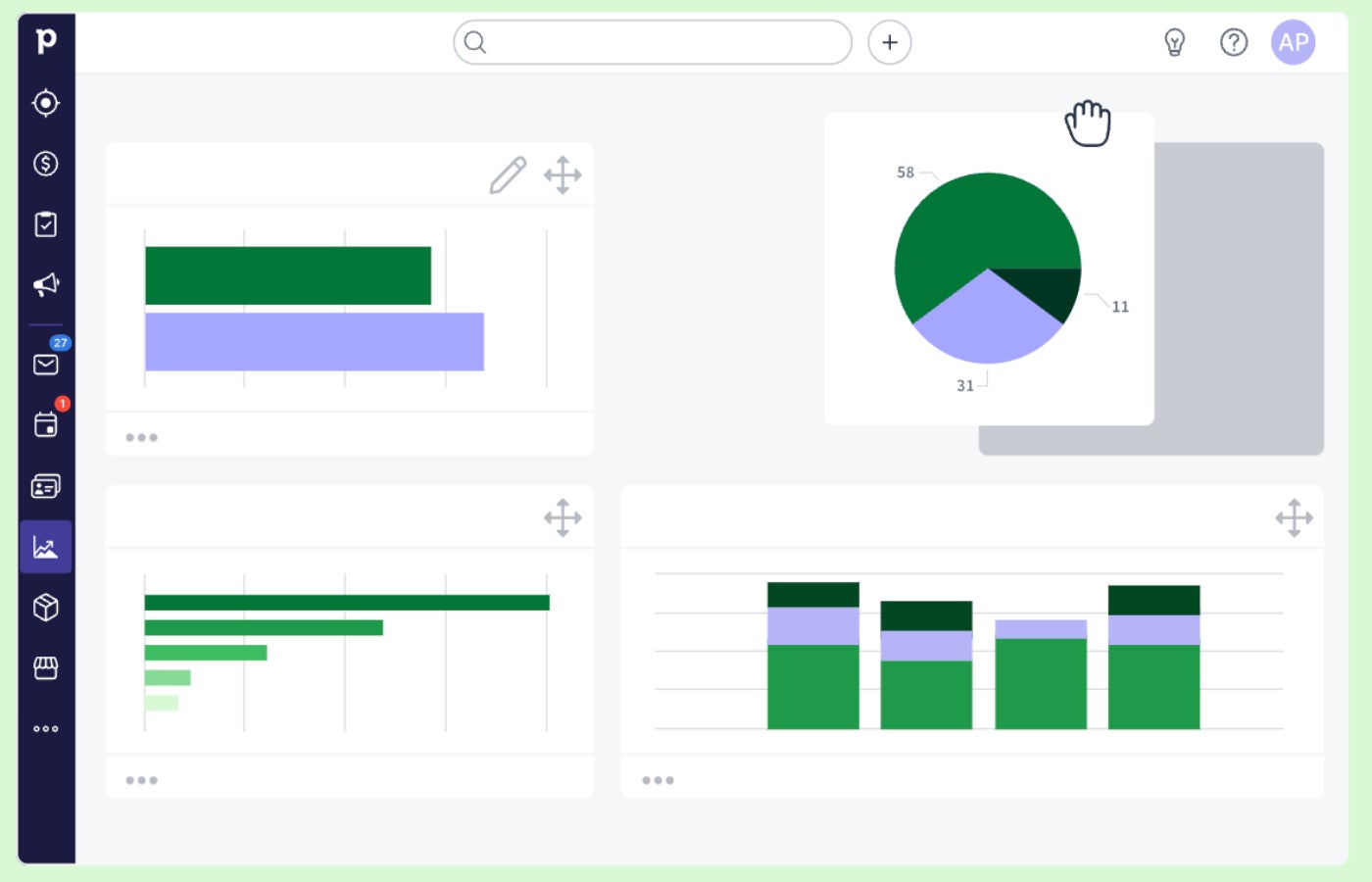
Pipedrive pros and cons
| Pros | Cons |
|---|---|
| 14-day free trial. | Premium plans that offer the most features can be costly. |
| 350+ possible integrations. | Users report limitations around configuring custom reports. |
| Users report a simple and intuitive UX/UI. | Users report occasional email integration glitches. |
Why we choose Pipedrive
Pipedrive is a sales-forward CRM provider that lets users track pipelines, manage leads and automate miscellaneous tasks so reps — in this case, healthcare providers — can focus on patients’ needs. Its paid plans and intuitive and visually appealing interface make it a great option for smaller practices or businesses that are growing and need a product that is scalable.
While Pipedrive offers a healthy amount of CRM data privacy and security through compliances, certifications and secure infrastructure, the tool isn’t HIPAA compliant and thus cannot guarantee security through that compliance. For a tool that is HIPAA compliant, check out any of the providers listed above.
For more insight into this CRM tool, read our full Pipedrive review.
How do I choose the best healthcare CRM software for my business?
Many of the tools we’ve listed above are generalized CRM providers that can also provide niche solutions for the healthcare industry. The next step is for you to narrow down this guide to find which solution is best suited for your business’ needs. I suggest requesting demos, signing up for free trials or connecting directly with the provider’s sales team. By taking this action, you’ll be able to communicate with providers to ask questions and learn more about the onboarding process.
Below are questions to consider asking when researching the right healthcare CRM software for your business:
- Does the provider offer the core features you need that are expected in the top general CRM?
- Is there free CRM software available from the provider that can meet your needs?
- Is the CRM considered open source, or is that something your business needs?
- Does the CRM software integrate with tools you already have in your tech stack?
Review methodology
To adequately review CRM solutions for healthcare providers or industry-related businesses, I used our in-house rubric with defined criteria for CRM industry standards. Since healthcare CRM software comes with niche offerings, I ensured each provider comes with a baseline of all core features an organization might need. After scoring each provider listed above through the rubric, an algorithm calculated an overall rating and I used that to assign each tool an ideal use case.
Here’s a breakdown of the scoring criteria I followed:
- Cost: Weighted 25% of the total score.
- Core features: Weighted 25% of the total score.
- Customizations: Weighted 15% of the total score.
- Integrations: Weighted 15% of the total score.
- Ease of use: Weighted 10% of the total score.
- Customer support: Weighted 10% of the total score.


